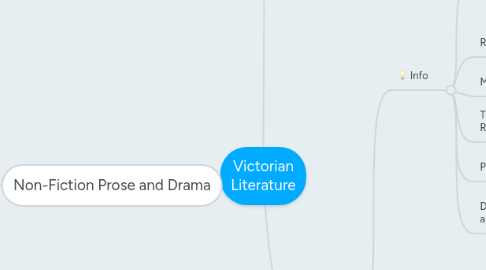
1. Non-Fiction Prose and Drama
1.1. People
1.1.1. Thomas Calyle (1795-1881)
1.1.1.1. Sartor Resartus (1833)
1.1.1.1.1. Autobiography, partly fictional
1.1.1.2. Stong influence on all major Victorian writers
1.1.2. Oscar Wilde (1854-1900)
1.1.2.1. The Importance of Being Earnest
1.1.2.1.1. Written as a joke mocking the most characteristic of all Victorian virtues: Earnestness
1.1.2.2. Criticised the attempts of Ruskin and Arnold to discover the art in every human being
1.1.3. Walter Pater (1839-1894)
1.1.3.1. Beauty becomes value in a modern world
1.1.3.2. Studies in the History of the Renaissance (1873)
1.1.3.2.1. Interprets Arnold's claim that the basis for a true understanding of art is subjective and impressionalistic
1.1.3.3. Influenced by Oscar Wilde
1.1.4. Matthew Arnold (1822-1888)
1.1.4.1. Poet, critic, writer
1.1.4.1.1. Devoted to social criticism in 1860's
1.1.4.2. Called ignorant middle class "Philistines"
1.1.5. John Stuart Mill (1806-1873)
1.1.5.1. James Mill (father) followed Utilitarianism of Jeremy Bentham and his Principles of Political Economy (1848)
1.1.5.2. Recognized that human intelligence expresses itself through imagination
1.1.5.3. Spokesperson for individual liberty
1.1.5.4. On Liberty (1859)
1.1.5.4.1. Individule must be free not only from political tyranny but from the tyranny of the opinion of others
1.1.5.5. On the Subjection of Women (1869)
1.1.5.5.1. Extended his ideal of freedom to women (who were oppressed under the middle-class Victorian code of moral respectability
1.1.6. John Ruskin (1819-1900)
1.1.6.1. Influenced by Thomas Cayle
1.1.6.1.1. Inspired by Carlyle's attacks on Victorian Greed and industrial society
1.1.6.2. Most wide ranging and eloquent writers of Victorian era, He was an art critic
1.1.6.3. Persued the idea of making life more humane; less ugly and alienating
1.1.6.4. Later writings were a major inspiration for British socialism and the labour movement
1.1.6.5. Influenced modern figures such as Frank Lloyd Wright, and Mahatma Gandhi
1.2. Info
1.2.1. Victorian prose writers reflected critically and prophetically on the main issues of the day
1.2.2. Victorian Literature had much more personal qualities involved in the story
1.2.3. Many novels and other literary works from the Victorian era tried to connect to the audience and reality through the inventiveness of characters
2. Poetry
2.1. Info
2.1.1. Poets
2.1.1.1. It was nice enough for the poet to express the pain of being born after the age of secure religious belief
2.1.1.2. Victorian poets saw the need for a more objective and socially engaged poetic vision
2.1.2. Readers
2.1.2.1. heightened the sense of public obligation from the poet
2.1.3. Much of poetry gives expression and vitality
2.1.4. The best Victorian poetry builds upon the Romantic concern of human consciousnes
2.1.5. Pre-Raphaelite Brotherhood
2.1.5.1. Formed in 1818 by Dante Gabriel Rossetti along with other writers and poets
2.1.6. Deep impulse in Victorian poetry to express doubt and a sense of alienation at finding oneself
2.2. People
2.2.1. Alfred, Lord Tennyson (1809-1892)
2.2.1.1. Inluenced by Bryon, Scott, and Keats
2.2.1.2. Uses technical resources to evoke a sense of wistful, meloncholy longing for a distant experience
2.2.1.3. Incredibly well known Poet
2.2.2. Robert Browning (1812-1889)
2.2.2.1. Influenced by Shelley
2.2.2.2. Poet and writer
2.2.3. Matthew Arnold (1822-1888)
2.2.3.1. "Wandering between two worlds, one dead,/ The other powerless to be born"
2.2.3.2. Dover Beach
2.2.3.2.1. Concludes with the speaker finding himself metaphysically.
2.2.3.2.2. Browning attributed to his Arnold's poetry style, using the same dramatic monologue to explore the motives and attitudes of fictional speakers (often obsessed with darker aspects of life
2.2.4. Gerard Manley Hopkins (1844-1889)
2.2.4.1. Both Hopkins and Browning participated in radical and unsettling stylistic exploration which pointed the way to the verbal dislocations and the dissonances of modern poetry
2.2.4.2. Poet
3. The Novel
3.1. People
3.1.1. Charles Dickens (1812-1870)
3.1.1.1. Master of serial publication and leading Victorian novelist from 1837 till death
3.1.1.1.1. Most successful contemporary novelist
3.1.1.2. Wrote comedies, had special fondness for the theatre; immensly inventive
3.1.1.2.1. Appeal of his novels were mainly due to the comedic aspects
3.1.1.3. Concerned with politics and social injustice - satirical attacks based on greed, hypocrisy, etc. that went along with Victorian prosperity
3.1.1.4. Victorian novelists thought Dickens' novels were too theatrical and melodramatic to represent reality
3.1.2. William Makepeace Thackeray (1811-1863)
3.1.2.1. More restrained than Dickens
3.1.3. Anthony Trollope (1815-1882)
3.1.3.1. More restrained than Dickens
3.1.4. George Eliot (1819-1880)
3.1.4.1. Real name was 'Mary Ann Evans'
3.1.4.2. was concerned of the free will intelligence, and morals of her characters as they try to establish a role in their life
3.1.4.3. Among some of the greatest Novels ever written
3.1.5. Thomas Hardy
3.1.5.1. Focused on the inner lives of his characters although his emphasis was very different for Eliot's
3.1.5.2. Hardy's characters were controlled by outside forces that could not be regulated or shaped.
3.1.5.3. Novels are set in Wessex, a rural area in southwest England
3.2. Info
3.2.1. Most Victorian novels are directly concerned with the issues and problems of contemporary society
3.2.1.1. Usually create a rich, realistic feel of 19th century life
3.2.1.2. Often novels were published in serial form
3.2.1.2.1. Responsible for the dramatically episodic plots of Victorian novels
3.2.1.2.2. New novels were written in response to the public's reaction to previous serial novels

